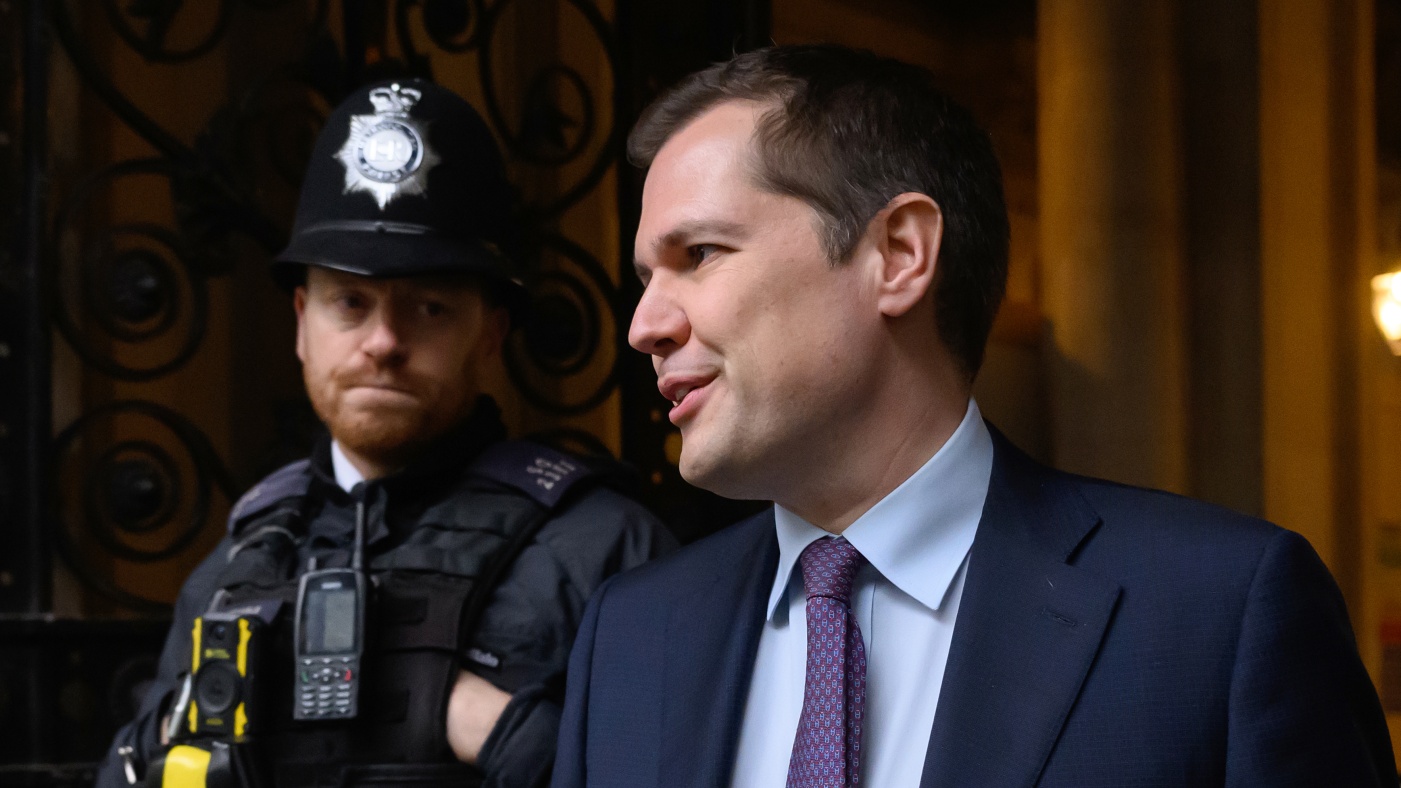Tory mood 'sulphurous' as Jenrick resigns over Rwanda plan
Immigration minister and Sunak ally quits as emergency legislation 'does not go far enough'

A free daily email with the biggest news stories of the day – and the best features from TheWeek.com
You are now subscribed
Your newsletter sign-up was successful
The government has been plunged into crisis by the resignation of the immigration minister hours after the publication of emergency legislation designed to revive the Rwanda deportation plan.
In his resignation letter, Robert Jenrick said the new legislation "does not go far enough", and that "stronger protections" were needed to end "the merry-go-round of legal challenges which risk paralysing the scheme".
At a news conference today called by Rishi Sunak, the prime minister insisted the new legislation "blocks every single reason that has ever been used to prevent flights to Rwanda from taking off".
The Week
Escape your echo chamber. Get the facts behind the news, plus analysis from multiple perspectives.

Sign up for The Week's Free Newsletters
From our morning news briefing to a weekly Good News Newsletter, get the best of The Week delivered directly to your inbox.
From our morning news briefing to a weekly Good News Newsletter, get the best of The Week delivered directly to your inbox.
The emergency legislation, published yesterday, declares Rwanda to be a "safe" country and sets aside parts of the UK's Human Rights Act to prevent further legal challenges that could stop the plan from going ahead. This, the government hopes, will allow it to get around the ruling by the UK Supreme Court that the scheme is "unlawful".
Ousting courts could 'collapse entire scheme'
But the draft legislation does not go as far as Jenrick and other MPs on the right of the party – including former home secretary Suella Braverman – would like.
They want the bill to completely disregard the Human Rights Act as well as override the European Convention on Human Rights (ECHR), the Refugee Convention and other aspects of international law.
In a letter thanking Jenrick for his service in government, Sunak wrote that he feared his former ally's departure was "based on a fundamental misunderstanding of the situation".
A free daily email with the biggest news stories of the day – and the best features from TheWeek.com
"If we were to oust the courts entirely, we would collapse the entire scheme," said Sunak. "The Rwandan government have been clear that they would not accept the UK basing this scheme on legislation that could be considered in breach of our international law obligations," he wrote.
PM faces his 'biggest crisis' to date
Sunak is seeking a plan to deal with asylum seekers that is "legally, practically and politically navigable", said the BBC's political editor Chris Mason. But the "blunt truth" is that we now know his immigration minister "thinks he's destined to fail, again".
Sunak has acted as a "cork in the bottle of Conservative chaos" during his tenure as prime minister, but Jenrick's resignation "has the potential to send that cork whizzing over the No10 garden wall".
The question now is what happens to the prime minister "as he confronts the biggest crisis he has faced by a country mile", said Sky News' political editor Beth Rigby. With his party "deeply divided" over how to proceed with the emergency laws, Sunak is now facing a "vicious backlash" from the right of his party after the departure of two of its stalwarts, Braverman and Jenrick.
There are up to 100 MPs in right-wing groups, such as the ERG, the New Conservatives, and the Common Sense Group, who met earlier this week to discuss strategy and hoped to convince Sunak to pull out of the ECHR, a step they believe is "necessary to start the flights" to Rwanda.
When the emergency bill comes to a vote in the Commons early next week, not all of them will be willing to rebel – but up to 30 could vote against it, which would be "enough to sink Sunak's majority". The mood among Conservative MPs is "sulphurous", added Rigby.
Jenrick's resignation has created a "dangerous moment" for Sunak, agreed Eleni Courea in Politico's London Playbook newsletter. There are whispers that Sunak could soon face a leadership challenge and that "Jenrick and Braverman are among those positioning themselves for the future".
Conservative whips will now be on "high alert" for more resignations and letters of no confidence to then1922 committee chair Graham Brady.
The fact that Sunak called a press conference today at such short notice "is evidence that he and his team do grasp the political peril he is now in", although he "wasn't keen to acknowledge it at the podium", said the BBC's Henry Zeffman.
But the press conference did contain one "crucial admission". Sunak said that the vote on the emergency legislation would not be treated as a confidence vote, meaning that MPs could defy him without having the Conservative whip withdrawn. The fact that he is "not wielding the ultimate threat" suggests that "as it stands he is not that confident in his prospects of success".
Sorcha Bradley is a writer at The Week and a regular on “The Week Unwrapped” podcast. She worked at The Week magazine for a year and a half before taking up her current role with the digital team, where she mostly covers UK current affairs and politics. Before joining The Week, Sorcha worked at slow-news start-up Tortoise Media. She has also written for Sky News, The Sunday Times, the London Evening Standard and Grazia magazine, among other publications. She has a master’s in newspaper journalism from City, University of London, where she specialised in political journalism.
-
 What are the best investments for beginners?
What are the best investments for beginners?The Explainer Stocks and ETFs and bonds, oh my
-
 What to know before filing your own taxes for the first time
What to know before filing your own taxes for the first timethe explainer Tackle this financial milestone with confidence
-
 The biggest box office flops of the 21st century
The biggest box office flops of the 21st centuryin depth Unnecessary remakes and turgid, expensive CGI-fests highlight this list of these most notorious box-office losers
-
 Big-time money squabbles: the conflict over California’s proposed billionaire tax
Big-time money squabbles: the conflict over California’s proposed billionaire taxTalking Points Californians worth more than $1.1 billion would pay a one-time 5% tax
-
 The Mandelson files: Labour Svengali’s parting gift to Starmer
The Mandelson files: Labour Svengali’s parting gift to StarmerThe Explainer Texts and emails about Mandelson’s appointment as US ambassador could fuel biggest political scandal ‘for a generation’
-
 Did Alex Pretti’s killing open a GOP rift on guns?
Did Alex Pretti’s killing open a GOP rift on guns?Talking Points Second Amendment groups push back on the White House narrative
-
 Washington grapples with ICE’s growing footprint — and future
Washington grapples with ICE’s growing footprint — and futureTALKING POINTS The deadly provocations of federal officers in Minnesota have put ICE back in the national spotlight
-
 Trump’s Greenland ambitions push NATO to the edge
Trump’s Greenland ambitions push NATO to the edgeTalking Points The military alliance is facing its worst-ever crisis
-
 Three consequences from the Jenrick defection
Three consequences from the Jenrick defectionThe Explainer Both Kemi Badenoch and Nigel Farage may claim victory, but Jenrick’s move has ‘all-but ended the chances of any deal to unite the British right’
-
 Why is Trump threatening defense firms?
Why is Trump threatening defense firms?Talking Points CEO pay and stock buybacks will be restricted
-
 Nicolás Maduro: from bus driver to Venezuela’s president
Nicolás Maduro: from bus driver to Venezuela’s presidentIn the Spotlight Shock capture by US special forces comes after Maduro’s 12-year rule proved that ‘underestimating him was a mistake’